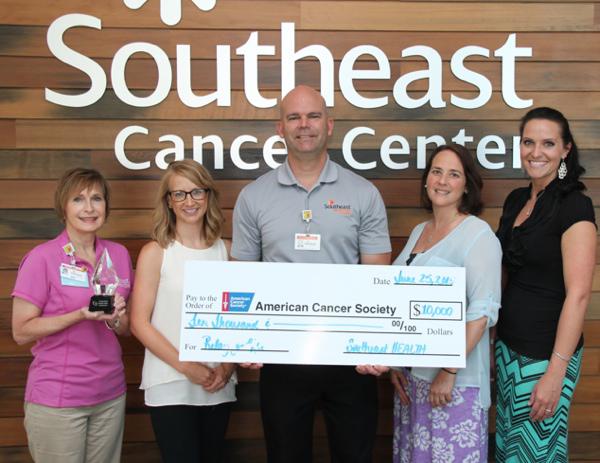
Cape Girardeau, Missouri - SoutheastHEALTH has received The Society Award for its support of Relay for Life, which annually raises funds for the American Cancer Society and the fight against cancer.
SoutheastHEALTH representatives, who are actively involved in the fundraiser, presented Southeast’s check for $10,000 to the Cancer Society.
Pictured from left at the Southeast Cancer Center: Mitzi Richter of the Southeast Cancer Center, holding the award; Kelli Behrle of the American Cancer Society; Scott Givens, manager of HealthPoint Fitness in Jackson; and Kim Thorwegen and Kasie Jones-Holder, both of the Cancer Society. Not pictured is Pam Buchheit of Southeast’s Social Services Department.
About SoutheastHEALTH
At SoutheastHEALTH, the region's premier healthcare system in southeast Missouri, our patients receive excellent care of the highest clinical quality, close to home. Within our network are more than 50 care locations in 14 communities, including hospitals, primary and specialty care clinics representing over 30 clinical specialties and extending care for patients in a four-state area. Learn more at SEhealth.org.
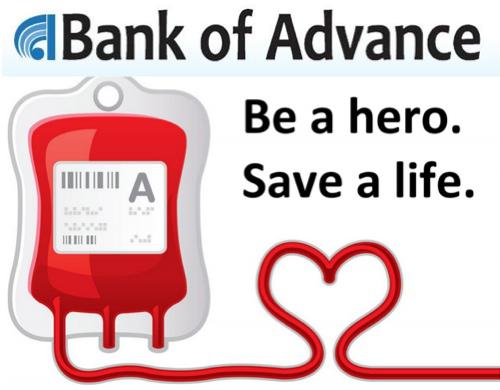
That’s why the American Red Cross is asking for your help. By letting community members know about the need for blood during the summer, you can give hope to patients in need.
Eligible blood and platelet donors are encouraged to choose their day to donate blood or platelets this summer.
The Bank of Advance will host a Blood Drive at their Advance location on Friday, July 17th from 1:00 p.m. - 5:00 p.m. The Bank of Advance is located at 105 East Gabriel Street.
Donated blood is perishable and must be constantly replenished to keep up with the demand. Red blood cells, with a shelf life of only 42 days, are the most frequently transfused blood component, and are always needed by hospitals.
Eligible donors can give red cells through either a regular whole blood donation or a double red cell donation, where available. Double red cell donations yield twice the usual amount of red cells in a single appointment and are accepted at select donation locations. Double red cell donors must meet additional eligibility criteria, which will be determined at the donation appointment.
Donors with all blood types are needed, especially those with types O negative, A negative and B negative. Whole blood can be donated every 56 days, and double red cells may be donated every 112 days, up to three times per year.
To find a donation opportunity or make an appointment to give blood, download the Red Cross Blood Donor App, visit redcrossblood.org or call 1-800-RED CROSS (1-800-733-2767).
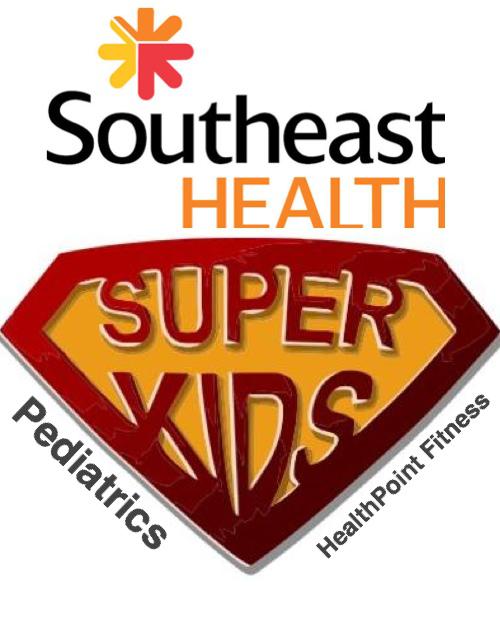
Cape Girardeau, Missouri - Area “Super Kids” are invited to take part in an event sponsored by Southeast Pediatrics at HealthPoint Fitness in Cape Girardeau from 6 to 7:30 p.m. on Thursday, July 30. The event is open to children, ages 4 to 10.
At “Super Kids,” children will visit stations and take part in these educational, hands-on activities:
· Play It Safe Outdoors – Learn the importance of having fun in the sun without burns and bug bites.
· How Sweet It Is! – Kids (and adults) will be surprised to see just how much sugar is hiding the beverages they love.
· Fun with Fitness – Join in the fun with HealthPoint Fitness class demonstrations and activities.
· Eating Healthy – Southeast’s dietitians will show kids how yummy foods can be fun and healthy.
The first 200 participants will receive $10 Academy Sports gift cards for completing all of the stations and participating in the evening’s activities.
Parents and kids also may visit with pediatricians and staff from Southeast Pediatrics. The medical practice includes Greg Cugini, MD; Paul Leland, DO; Kali Francis, MD; and Chelsea Grigery, MD; and nurse practitioner Lindsay R. McVey, FNP, BC.
Space is limited, so register today by calling 1-844-482-5833 or register online at SEhealth.org/classes-events.
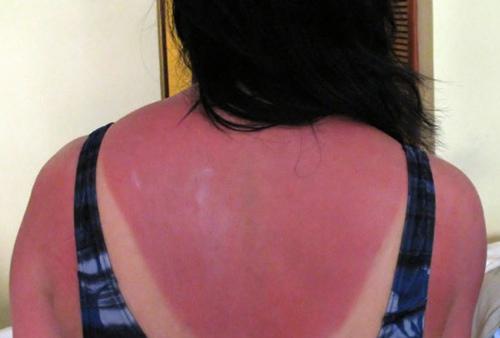
During extremely hot and humid weather, your body's ability to cool itself is challenged. When the body heats too rapidly to cool itself properly, or when too much fluid or salt is lost through dehydration or sweating, body temperature rises and you or someone you care about may experience a heat-related illness.
It is important to know the symptoms of excessive heat exposure and the appropriate responses. The Centers for Disease Control and Prevention provides a list of warning signs and symptoms of heat illness, and recommended first aid steps. Some of these symptoms and steps are listed below.
HEAT CRAMPS:
Heat cramps may be the first sign of heat-related illness, and may lead to heat exhaustion or stroke.
Symptoms:
- Painful muscle cramps and spasms usually in legs and abdomen
- Heavy sweating
First Aid:
- Apply firm pressure on cramping muscles or gently massage to relieve spasm.
- Give sips of water unless the person complains of nausea, then stop giving water
HEAT EXHAUSTION:
Symptoms:
- Heavy sweating
- Weakness
- Cool, pale, clammy skin
- Fast, weak pulse
- Possible muscle cramps
- Dizziness
- Nausea or vomiting
- Fainting
First Aid:
- Move person to a cooler environment
- Lay person down and loosen clothing
- Apply cool, wet cloths to as much of the body as possible
- Fan or move victim to air conditioned room
- Offer sips of water
- If person vomits more than once, seek immediate medical attention.
HEAT STROKE:
Symptoms:
- Altered mental state
- One or more of the following symptons: throbbing headache, confusion, nausea, dizziness, shallow breathing
- Body temperature above 103°F
- Hot, red, dry or moist skin
- Rapid and strong pulse
- Faints, loses consciousness
First Aid:
- Heat stroke is a severe medical emergency. Call 911 or get the victim to a hospital immediately. Delay can be fatal.
- Move the victim to a cooler, preferably air-conditioned, environment.
- Reduce body temperature with cool cloths or bath.
- Use fan if heat index temperatures are below the high 90s. A fan can makes you hotter at higher temperatures.
- Do NOT give fluids.
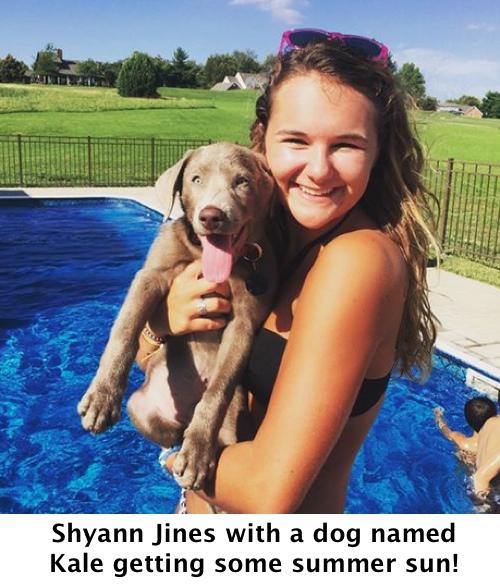
Sunshine is here to stay
When you think of summer, most think having fun in the sun with friends and family. It’s important to also keep your safety top priority. July is UV Safety Month and a good time to brush up on safety tips to keep your family healthy in the sun. Here are the top three summer health concerns and how to avoid them:
Too Much Sun
Staying out in the sun too long can lead to problems like sunburns, premature aging, eye damage and even skin cancer. Fortunately, it’s easy to protect yourself from the harmful UV rays that cause most of these problems:
• Wear sunglasses: Your sunglasses should have a label on them that says they protect against UV-A and UV-B rays.
• Wear the proper clothing: Sun shirts over swimsuits and large hats protect your body by blocking the sun’s harmful rays.
• Stay in the shade: You should try to stay out of the sun from 10am to 4pm. Babies less than a year old should never be out in the sun.
• Wear sunscreen: It’s not just for swimming or sunbathing. Wear sunscreen with an SPF of 15 or higher on exposed skin areas every day. Remember to reapply every few hours if active.
Water Danger
Drowning is a leading cause of death among little ones. Take a few simple precautions to keep swimming time at the pool or beach safe.
• Supervise, supervise, supervise: All children, even those who can swim, should have adult supervision while near a body of water. Swim lessons are recommended for kids 4 and over. For children who can’t swim, stay within several feet of them while they are in water; consider using floating arm bands or a life vest.
• Secure your pool: If you have a pool, use a net or fence to keep kids away when you’re not swimming.
• Learn CPR: Basic courses are offered in your community and you can take an infant-specific course as well. Visit www.heart.org or www.redcross.org for details.
Dehydration and Heat Exhaustion
During hot summer months, everyone needs to drink more water to balance fluids lost by sweating. Keep your kids well hydrated, especially if they are playing outside. Also, be sure never to leave a child alone in a hot car. Even a few minutes can be deadly because the heat inside the car builds quickly and there is no air flowing through the car when doors and windows are closed.
For more information, visit www.cdc.gov.

